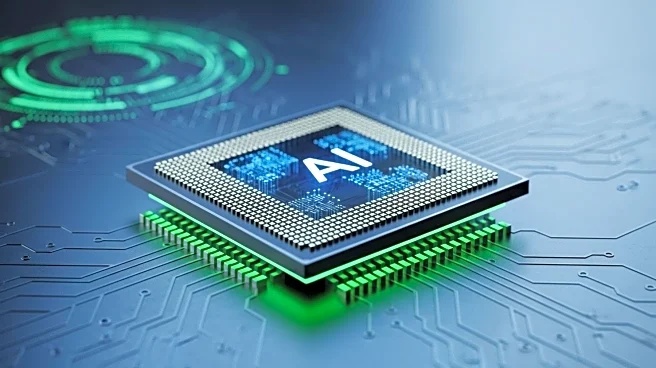What's Happening?
OpenAI has reportedly entered into a partnership with Broadcom to design and manufacture its own AI processors. This move is seen as part of a long-term strategy to reduce reliance on Nvidia's GPUs, which currently power OpenAI's AI model training and inference systems. Broadcom's CEO, Hock Tan, confirmed the deal, stating that the company has secured $10 billion in AI system orders from a new customer, expected to boost revenue significantly by 2026. Despite this development, OpenAI will continue to use Nvidia's chips for the foreseeable future due to its existing software stack being optimized for Nvidia hardware.
Why It's Important?
The partnership between OpenAI and Broadcom could have significant implications for the AI industry, particularly in terms of cost management and technological independence. By developing its own processors, OpenAI may reduce expenses associated with purchasing high-cost Nvidia chips, which have been a major financial burden for companies like OpenAI, Meta, and Microsoft. This shift could also encourage other tech giants to explore similar strategies, potentially altering the competitive landscape in the semiconductor market. Additionally, Broadcom's involvement highlights the growing demand for AI-specific hardware, which could drive innovation and investment in this sector.
What's Next?
OpenAI's transition to using Broadcom's processors will take time, as the current software stack is heavily reliant on Nvidia's architecture. The shift will require significant adjustments to ensure compatibility and performance. Meanwhile, Nvidia is expected to continue focusing on its machine learning megachips, given the high demand and profitability of its data center division. As OpenAI progresses with its plans, other companies may watch closely to assess the feasibility and benefits of developing proprietary AI hardware.
Beyond the Headlines
This development raises questions about the sustainability of current AI hardware costs and the potential for increased competition in the semiconductor industry. As more companies seek to develop in-house solutions, there could be a shift towards greater technological autonomy and innovation. Additionally, the move may influence pricing strategies and availability of AI chips, impacting smaller firms and startups in the AI space.









